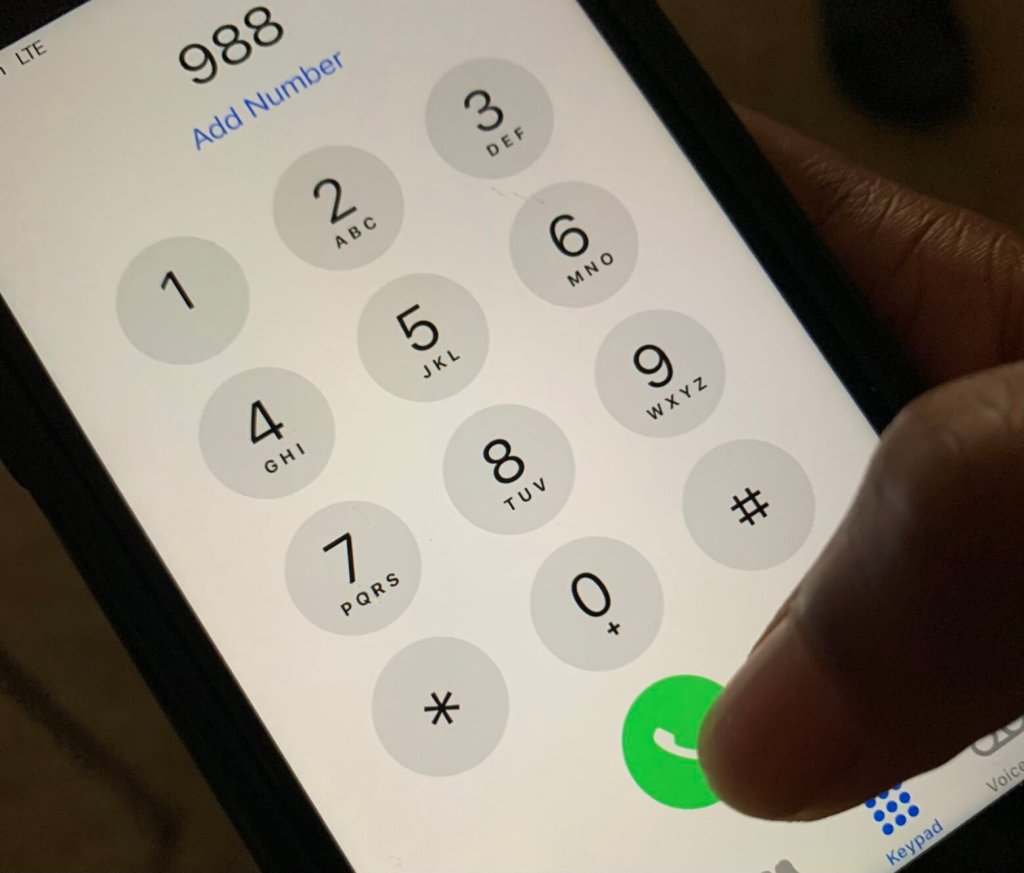Alabama plans to impose phone tax to fund 988 crisis line
Published 4:21 pm Tuesday, May 23, 2023

- A phone screen with the 988 dialed.
MONTGOMERY — The 911 call made by Frances Holk-Jones amid her husband’s suicide is “etched in her brain forever.”
She testified to the Alabama Senate Fiscal Responsibility & Economic Development Committee during the May 17 meeting in support of a proposed 98 cents fee on landline, wireless or other voice communication services bills to fund the recently launched 988 crisis hotline.
Her husband had called her to say his farewell before he committed suicide.
“You immediately go into crisis mode and you do the best darn sales job that you’ve ever done. You try to convince in my case, my husband to stay on this earth,” Holk-Jones, a current state representative, said. “Talk about an immediate, untrained, emotional professional. I did the best job that I could for 13 minutes.”
When her husband hung up the phone she called 911 and told the dispatcher about the call with her husband, including where he may be located.
“The 911 dispatcher said, ‘Hold please.’ and for what seemed to be an eternity, only to be eventually answered by a second person who said. ‘Dispatch, how may I help you?’ and I had to go through all of it again,” Holk-Jones recalled. “988 would not have kept my husband on this earth. He had made his decision. and yes, 988 costs money … but it’s the best way to have a solid cash flow into Alabama mental health assistance funding. It’s not the only answer. But it’s a heck of a good solid financial start.”
While 911 remains the phone number for public safety related calls, since 2022, the 988 line has been launched nationally as the main line for mental health related calls. The 988 crisis line was signed into law by former President Donald Trump in 2020 with anticipation that states would collect funds to build the system in addition to federal funding.
“We are able to have a fee and what we do with that is that it would allow to have mental health services 24/7 365 in every county in the state of Alabama,” said Sen. Garland Gudger, chair of the Committee, said of the proposed Senate Bill 328.
Gudger gave an example of someone who may be walking down the street experiencing a mental derangement or substance abuse episode that may need help. He said the proposed $0.98 fee would shore up resources and funding that would often be used in law enforcement, fire, or EMS response or jail housing for such person.
“Is the jail equipped to handle mental health? No they’re not and we’re paying for that care through taxpayers’ money,” Gudger said. “Where else do they take them? They take them to the hospital. The hospital most of the time are not covered for that and there has to be guards down through the ER. So we’re having to pay for indigent care through taxpayers money.”
Kim Boswell, commissioner for the Alabama Department of Mental Health, said in 2022, more than 65,000 children in Alabama experienced a major depressive episode, and suicide is one of the leading causes of death among ages 10-34.
Since the 988 crisis line launch in July 2022, more than 30,000 contacts have been made to the line in Alabama.
The establishment of the Alabama Crisis Care Fund through SB 328 would ensure 988 call centers are fully staffed, add more crisis centers and grow the number of mobile crisis centers statewide.
“The Alabama 988 act will help to relieve our law enforcement officers and hospitals from the void that they have been filling for far too long,” Boswell said. “So often when people are in a crisis they don’t know who to call or where to go… Imagine if every community had access to these vital services. 988 saves lives. Access to care saves lives. Lives depend on it.”
Danne Howard, deputy director of the Alabama Hospital Association, said the 988 funding is a first step to funding mental health resources in Alabama and taking the burden off of unequipped hospitals.
“Oftentimes law enforcement give them a choice, jail or the hospital emergency room. I’m gonna pick hospital if I have that option,” Howard said. “The problem after that is the hospitals often don’t have mental health resources and even when they do, it’s not the proper place for someone that’s in crisis. and after that, there’s really nowhere else to send them so they want up in a perpetual cycle held in a hospital emergency room for an indefinite amount of time.”
Holy McCorkle is the executive director of the Alabama Council for Behavioral Health Care, which represents providers in Alabama that answer the 988 calls.
She said the crisis center in Mobile County which has operated since 2021 and estimates that they have saved $17.8 million due to diverted inpatient hospitalizations, emergency rooms, arrests and ambulance transports.
“As you can see, this is not only a fiscally responsible, but ensures Alabamians in every county receive appropriate life saving response,” she said. “Your zip code should not dictate your access to mental health care and the time is now to pass.”
Mobile County 911 Director Charlie McNichol opined that people would be more inclined to call someone they know can help them in a time of need.
“Some people that are in crisis view 911 as the police and they don’t want them. They don’t want to be in trouble. They don’t want them to come out, “McNichol said. “So they may not feel like they can call 911 comfortably. Whereas if they have 988 they know what that’s for and they know that that is designed to help them.”
Cleo Washington, vice president of AT&T, said only five states (California, Colorado,Nevada, Virginia and Washington) so far have adopted a fee or tax to fund 988 operations. Washington State currently has the highest phone fee for the 988 services at 40 cents per month.
He suggested that 988 funding come from the state’s general fund budget like many statutes — like Georgia — have done.
“Fortunately, Chairman Reynolds lowered what was initially proposed, which was 98 cents as a minimum up to a maximum of $3,” Washington said. “It is again an issue of public policy for you all to decide whether this should be something from the wireless industry that if it is level priority—and it is— fund it through the general fund as opposed to a separate fee or a separate tax.”
The proposed 988 tax in Alabama is estimated to generate estimated $69 million annually by levying a 98 cents monthly surcharge on wireless communication devises, as well as a similar surcharge on certain prepaid retail transactions, beginning Oct. 1, 2024.
The Committee voted unanimously May 17 in support of the bill, which includes a hardship exemption. The bill now heads to the Senate floor.





